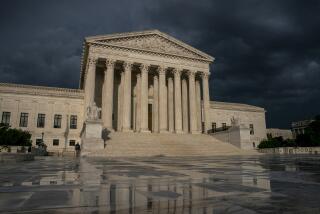Judge Bork on Civil Rights
President Reagan’s urging of the Senate to consider Bork on the basis of merit rather than ideology (July 30) ignores the more relevant problem of the judging process.
Bork’s theory that freedom of speech is meant for those who have something politically valuable to say could be the basis for banning scientific works or undesirable novels. This distrust of a free press and freedom of thought was effectively countered by Justice Oliver Wendell Holmes who, at 87, wrote: “If there is any principle of the Constitution that more imperatively calls for attachment than any other, it is the principle of free thought--not free thought for those who agree with us but freedom for the thought that we hate.”
The argument used by Bork that the First Amendment’s guarantee of freedom of speech and the press protects only “explicitly political” speech is an exercise in sophistry and equivocation.
Our Founding Fathers were believers in the minimal state, wherein individualism and laissez-faire liberalism were meant to bring liberty and freedom of speech. They were thinkers who upheld the supremacy of reason, not individual ideology. They supported freedom of religion and “the separation of church and state.”
Though Hamilton, Jefferson, Madison and others realized the problems that they faced in trying to balance the claims of various social classes against those of the federal government, they nevertheless kept the principles of Enlightenment as the foundation of the Constitution. As Jefferson wrote, “It is to secure our rights that we resort to government at all.”
If there is any intention of finding what the framers meant by what they wrote in the Constitution, it must be seen in the light of the historical arguments preceding its adoption. Perhaps more important than all the emphasis on ideology is the judging process. If Judge Bork and Atty. Gen. Edwin Meese III want to go back to the “original intent” of the framers, then an entirely new approach would be required, involving a thorough study of the Constitution’s antecedent history and genesis.
ARNOLD MADDALONI
San Diego
More to Read
Get the L.A. Times Politics newsletter
Deeply reported insights into legislation, politics and policy from Sacramento, Washington and beyond. In your inbox three times per week.
You may occasionally receive promotional content from the Los Angeles Times.










